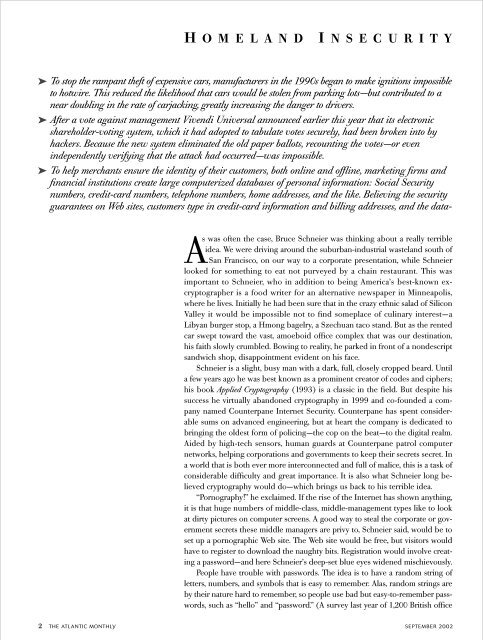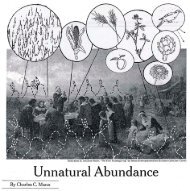HOMELAND INSECURITY - Charles C. Mann
HOMELAND INSECURITY - Charles C. Mann
HOMELAND INSECURITY - Charles C. Mann
Create successful ePaper yourself
Turn your PDF publications into a flip-book with our unique Google optimized e-Paper software.
Sept-Insecurity.pages 6/28/02 10:37 AM Page 2<br />
H O M E LAND I N S E C U R I T Y<br />
➤ To stop the rampant theft of expensive cars, manufacturers in the 1990s began to make ignitions impossible<br />
to hotwire. This reduced the likelihood that cars would be stolen from parking lots—but contributed to a<br />
near doubling in the rate of carjacking, greatly increasing the danger to drivers.<br />
➤ After a vote against management Vivendi Universal announced earlier this year that its electronic<br />
shareholder-voting system, which it had adopted to tabulate votes securely, had been broken into by<br />
hackers. Because the new system eliminated the old paper ballots, recounting the votes—or even<br />
independently verifying that the attack had occurred—was impossible.<br />
➤ To help merchants ensure the identity of their customers, both online and offline, marketing firms and<br />
financial institutions create large computerized databases of personal information: Social Security<br />
numbers, credit-card numbers, telephone numbers, home addresses, and the like. Believing the security<br />
guarantees on Web sites, customers type in credit-card information and billing addresses, and the data-<br />
As was often the case, Bruce Schneier was thinking about a really terrible<br />
idea. We were driving around the suburban-industrial wasteland south of<br />
San Francisco, on our way to a corporate presentation, while Schneier<br />
looked for something to eat not purveyed by a chain restaurant. This was<br />
important to Schneier, who in addition to being America’s best-known excryptographer<br />
is a food writer for an alternative newspaper in Minneapolis,<br />
where he lives. Initially he had been sure that in the crazy ethnic salad of Silicon<br />
Valley it would be impossible not to find someplace of culinary interest—a<br />
Libyan burger stop, a Hmong bagelry, a Szechuan taco stand. But as the rented<br />
car swept toward the vast, amoeboid office complex that was our destination,<br />
his faith slowly crumbled. Bowing to reality, he parked in front of a nondescript<br />
sandwich shop, disappointment evident on his face.<br />
Schneier is a slight, busy man with a dark, full, closely cropped beard. Until<br />
a few years ago he was best known as a prominent creator of codes and ciphers;<br />
his book Applied Cryptography (1993) is a classic in the field. But despite his<br />
success he virtually abandoned cryptography in 1999 and co-founded a company<br />
named Counterpane Internet Security. Counterpane has spent considerable<br />
sums on advanced engineering, but at heart the company is dedicated to<br />
bringing the oldest form of policing—the cop on the beat—to the digital realm.<br />
Aided by high-tech sensors, human guards at Counterpane patrol computer<br />
networks, helping corporations and governments to keep their secrets secret. In<br />
a world that is both ever more interconnected and full of malice, this is a task of<br />
considerable difficulty and great importance. It is also what Schneier long believed<br />
cryptography would do—which brings us back to his terrible idea.<br />
“Pornography!” he exclaimed. If the rise of the Internet has shown anything,<br />
it is that huge numbers of middle-class, middle-management types like to look<br />
at dirty pictures on computer screens. A good way to steal the corporate or government<br />
secrets these middle managers are privy to, Schneier said, would be to<br />
set up a pornographic Web site. The Web site would be free, but visitors would<br />
have to register to download the naughty bits. Registration would involve creating<br />
a password—and here Schneier’s deep-set blue eyes widened mischievously.<br />
People have trouble with passwords. The idea is to have a random string of<br />
letters, numbers, and symbols that is easy to remember. Alas, random strings are<br />
by their nature hard to remember, so people use bad but easy-to-remember passwords,<br />
such as “hello” and “password.” (A survey last year of 1,200 British office<br />
2 THE ATLANTIC MONTHLY SEPTEMBER 2002




